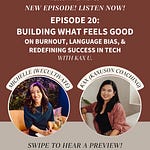After the Mic is a space for post-episode reflections from the podcast: what lingered, what shifted, and what got left unsaid. These are the thoughts that stay with me once the mic turns off. After I’m done speaking with my guests and releasing the full episode. They feature moments I’m still chewing on, questions that emerged in conversation, or things I wish I had said. This podcast is an audio-first production and you can listen to the full versions on Spotify and Apple. The video recording of the episode has been added above.
Full episode library and show notes at: https://www.wecultivate.world/podcast
🎙️After the Mic
Episode 5: From Ancient Egypt to Modern Classrooms: The Journey of Learning 65 Languages (and counting!) with Sean L. Young [Part 1]
Sean was my first guest on the podcast. I’ll be honest, I wasn’t sure how deep we’d go. At the time, I was still learning how to host a conversation publicly that felt like the ones I have privately: layered, unpolished, nuanced. I was still finding the line between safety and exposure.
There’s a lot in those episodes I stand by. But there’s also a lot I would have followed further, if I were recording it now. Roughly 6 months since we talked and 20 episodes released. But I’ll discuss this as time goes on with these post-episode reflections.
One moment that keeps sitting with me is the question of “methods.” Sean has developed his own method. Something that he teaches and shares through his work. And as we spoke, I realized I’ve long had a reflexive discomfort with the word. I’ve seen too many one-size-fits-all approaches sold as guaranteed transformation. And I’ve worked with too many people hurt by those exact systems.
But Sean wasn’t doing that. His approach was flexible, lived, and self-aware.
It made me pause and ask: Do I hate methods? Or do I just hate the way most people sell them?
I’m not great with social media or short-form content. I created a long-form podcast because I need nuance, context, and depth inside of everything.
See, what I reject isn’t structure. It’s the flattening of complexity.
When something gets sold as a quick fix, a universal solution, a script for belonging—that’s when I pull back. Because I know what it’s like to be told that your way of being, doing, or behaving is wrong.
I’m too aware of how this industry profits from keeping people lost.
Talking to Sean reminded me that a method can also be a mirror. And allowed me to dig deeper into my own messaging. Encouraging more people to do the deeper work of pattern recognition. To build greater self-awareness so they learn how to choose what goes and what stays.
🌟Language enthusiasts:
What’s your relationship to “methods,” as term or concept? Have they helped you, hurt you, or something in between?
Listen to the full episode on Spotify and Apple.
Full episode library and show notes here.









Share this post